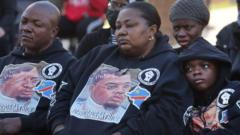In light of over 80 reported disappearances in recent months, public outrage is escalating as families clamor for accountability.
Fears Rise in Kenya Amid Wave of Abductions of Government Critics

Fears Rise in Kenya Amid Wave of Abductions of Government Critics
The alarming surge in reported abductions of critics is reviving fears of Kenya's oppressive past.
In Kenya, mounting public outrage is centered around a disturbing trend of reported abductions of government critics, with more than 80 cases logged over the last six months. A Nairobi judge has warned top security officials that they face imprisonment for contempt if they fail to appear in court on Monday regarding these troubling incidents. This marks a significant development in the context of nationwide protests against proposed tax increases that began last June, during which several protests and subsequent abductions have been documented.
While at least 24 individuals remain unaccounted for, police and government officials vehemently deny any involvement in kidnappings or illegal detentions. However, the country’s history of state-sponsored abductions looms large, leading many Kenyans to fear a return to a grim era reminiscent of the 1980s and 90s under authoritarian rule.
Prominent cases include the disappearances of several social media influencers who vanished last December and only recently resurfaced. Billy Mwangi, one of the influencers, was reportedly abducted by masked men and later dropped off far from his home. His father, Gerald Mwangi Karicha, shared his son’s traumatic return, revealing the psychological burden that such an experience has inflicted on the young man.
Jamil and Aslam Longton, two brothers held for 32 days, have also remained largely silent about their time in captivity due to fear of retribution. They described their experiences of being forcibly taken from their home and subjected to inhumane treatment.
Despite government spokesman Isaac Mwaura’s insistence that such organized abductions could stem from criminal motives rather than state-led actions, many, including journalist Gitobu Imanyara, assert that similar tactics are reminiscent of those used during the repressive regime of Daniel arap Moi.
Although reports of such disappearances have recently declined, clear accountability remains absent, with no one charged for these alleged abductions. Families of the missing endure ongoing hardships and despair, epitomized by Stacey Mutua, whose brother Steve Mbisi is among the still-missing, remaining hopeful yet distressed at the situation.
The rallying call for justice within Kenyan society grows louder, spurred on by social media that has made it increasingly difficult for the government to dismiss dissenting voices as it once did.



















